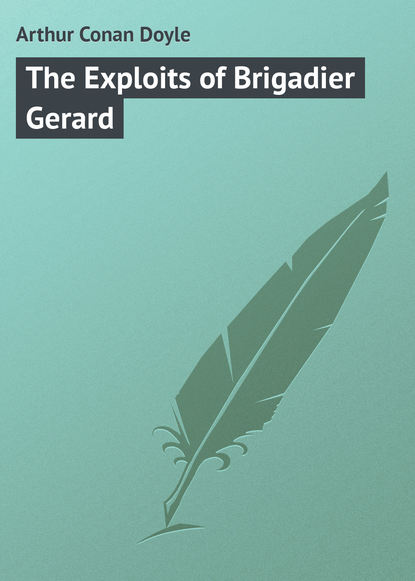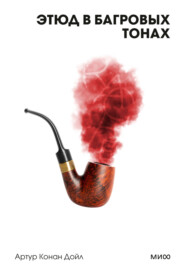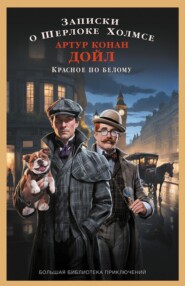По всем вопросам обращайтесь на: info@litportal.ru
(©) 2003-2025.
✖
The Exploits of Brigadier Gerard
Автор
Год написания книги
2014
Настройки чтения
Размер шрифта
Высота строк
Поля
'Where are your dice?' he cried.
'I have none.'
'Nor I. But I have cards.'
'Cards let it be,' said I.
'And the game?'
'I leave it to you.'
'Écarté, then – the best of three.'
I could not help smiling as I agreed, for I do not suppose that there were three men in France who were my masters at the game. I told the Bart as much as we dismounted. He smiled also as he listened.
'I was counted the best player at Watier's,' said he. 'With even luck you deserve to get off if you beat me.'
So we tethered our two horses and sat down one on either side of a great flat rock. The Bart took a pack of cards out of his tunic, and I had only to see him shuffle to convince me that I had no novice to deal with. We cut, and the deal fell to him.
My faith, it was a stake worth playing for. He wished to add a hundred gold pieces a game, but what was money when the fate of Colonel Etienne Gerard hung upon the cards? I felt as though all those who had reason to be interested in the game – my mother, my hussars, the Sixth Corps d'Armée, Ney, Massena, even the Emperor himself – were forming a ring round us in that desolate valley. Heavens, what a blow to one and all of them should the cards go against me! But I was confident, for my écarté play was as famous as my swordsmanship, and save old Bouvet of the Hussars of Bercheny, who won seventy-six out of one hundred and fifty games off me, I have always had the best of a series.
The first game I won right off, though I must confess that the cards were with me, and that my adversary could have done no more. In the second, I never played better and saved a trick by a finesse, but the Bart voled me once, marked the king, and ran out in the second hand. My faith, we were so excited that he laid his helmet down beside him and I my busby.
'I'll lay my roan mare against your black horse,' said he.
'Done!' said I.
'Sword against sword.'
'Done!' said I.
'Saddle, bridle, and stirrups!' he cried.
'Done!' I shouted.
I had caught this spirit of sport from him. I would have laid my hussars against his dragoons had they been ours to pledge.
And then began the game of games. Oh, he played, this Englishman – he played in a way that was worthy of such a stake. But I, my friends, I was superb! Of the five which I had to make to win, I gained three on the first hand. The Bart bit his moustache and drummed his hands, while I already felt myself at the head of my dear little rascals. On the second, I turned the king, but lost two tricks – and my score was four to his two. When I saw my next hand I could not but give a cry of delight. 'If I cannot gain my freedom on this,' thought I, 'I deserve to remain for ever in chains.'
Give me the cards, landlord, and I will lay them out on the table for you.
Here was my hand: knave and ace of clubs, queen and knave of diamonds, and king of hearts. Clubs were trumps, mark you, and I had but one point between me and freedom. He knew it was the crisis, and he undid his tunic. I threw my dolman on the ground. He led the ten of spades. I took it with my ace of trumps. One point in my favour. The correct play was to clear the trumps, and I led the knave. Down came the queen upon it, and the game was equal. He led the eight of spades, and I could only discard my queen of diamonds. Then came the seven of spades, and the hair stood straight up on my head. We each threw down a king at the final. He had won two points, and my beautiful hand had been mastered by his inferior one. I could have rolled on the ground as I thought of it. They used to play very good écarté at Watier's in the year '10. I say it – I, Brigadier Gerard.
The last game was now four all. This next hand must settle it one way or the other. He undid his sash, and I put away my sword-belt. He was cool, this Englishman, and I tried to be so also, but the perspiration would trickle into my eyes. The deal lay with him, and I may confess to you, my friends, that my hands shook so that I could hardly pick my cards from the rock. But when I raised them, what was the first thing that my eyes rested upon? It was the king, the king, the glorious king of trumps! My mouth was open to declare it when the words were frozen upon my lips by the appearance of my comrade.
He held his cards in his hand, but his jaw had fallen, and his eyes were staring over my shoulder with the most dreadful expression of consternation and surprise. I whisked round, and I was myself amazed at what I saw.
Three men were standing quite close to us – fifteen mètres at the farthest. The middle one was of a good height, and yet not too tall – about the same height, in fact, that I am myself. He was clad in a dark uniform with a small cocked hat, and some sort of white plume upon the side. But I had little thought of his dress. It was his face, his gaunt cheeks, his beak-like nose, his masterful blue eyes, his thin, firm slit of a mouth which made one feel that this was a wonderful man, a man of a million. His brows were tied into a knot, and he cast such a glance at my poor Bart from under them that one by one the cards came fluttering down from his nerveless fingers. Of the two other men, one, who had a face as brown and hard as though it had been carved out of old oak, wore a bright red coat, while the other, a fine portly man with bushy side-whiskers, was in a blue jacket with gold facings. Some little distance behind, three orderlies were holding as many horses, and an escort of dragoons was waiting in the rear.
'Heh, Crauford, what the deuce is this?' asked the thin man.
'D'you hear, sir?' cried the man with the red coat. 'Lord Wellington wants to know what this means.'
My poor Bart broke into an account of all that had occurred, but that rock-face never softened for an instant.
'Pretty fine, 'pon my word, General Crauford,' he broke in. 'The discipline of this force must be maintained, sir. Report yourself at headquarters as a prisoner.'
It was dreadful to me to see the Bart mount his horse and ride off with hanging head. I could not endure it. I threw myself before this English General. I pleaded with him for my friend. I told him how I, Colonel Gerard, would witness what a dashing young officer he was. Ah, my eloquence might have melted the hardest heart; I brought tears to my own eyes, but none to his. My voice broke, and I could say no more.
'What weight do you put on your mules, sir, in the French service?' he asked. Yes, that was all this phlegmatic Englishman had to answer to these burning words of mine. That was his reply to what would have made a Frenchman weep upon my shoulder.
'What weight on a mule?' asked the man with the red coat.
'Two hundred and ten pounds,' said I.
'Then you load them deucedly badly,' said Lord Wellington. 'Remove the prisoner to the rear.'
His dragoons closed in upon me, and I–I was driven mad, as I thought that the game had been in my hands, and that I ought at that moment to be a free man. I held the cards up in front of the General.
'See, my lord!' I cried; 'I played for my freedom and I won, for, as you perceive, I hold the king.'
For the first time a slight smile softened his gaunt face.
'On the contrary,' said he, as he mounted his horse, 'it is I who won, for, as you perceive, my King holds you.'
4. How the king held the brigadier
Murat was undoubtedly an excellent cavalry officer, but he had too much swagger, which spoils many a good soldier. Lasalle, too, was a very dashing leader, but he ruined himself with wine and folly. Now I, Etienne Gerard, was always totally devoid of swagger, and at the same time I was very abstemious, except, maybe, at the end of a campaign, or when I met an old comrade-in-arms. For these reasons I might, perhaps, had it not been for a certain diffidence, have claimed to be the most valuable officer in my own branch of the Service. It is true that I never rose to be more than a chief of brigade, but then, as everyone knows, no one had a chance of rising to the top unless he had the good fortune to be with the Emperor in his early campaigns. Except Lasalle, and Labau, and Drouet, I can hardly remember any one of the generals who had not already made his name before the Egyptian business. Even I, with all my brilliant qualities, could only attain the head of my brigade, and also the special medal of honour, which I received from the Emperor himself, and which I keep at home in a leathern pouch.
But though I never rose higher than this, my qualities were very well known to those who had served with me, and also to the English. After they had captured me in the way which I described to you the other night, they kept a very good guard over me at Oporto, and I promise you that they did not give such a formidable opponent a chance of slipping through their fingers. It was on the 10th of August that I was escorted on board the transport which was to take us to England, and behold me before the end of the month in the great prison which had been built for us at Dartmoor!
'L'hôtel Français, et Pension,' we used to call it, for you understand that we were all brave men there, and that we did not lose our spirits because we were in adversity.
It was only those officers who refused to give their parole who were confined at Dartmoor, and most of the prisoners were seamen, or from the ranks. You ask me, perhaps, why it was that I did not give this parole, and so enjoy the same good treatment as most of my brother officers. Well, I had two reasons, and both of them were sufficiently strong.
In the first place, I had so much confidence in myself, that I was quite convinced that I could escape. In the second, my family, though of good repute, has never been wealthy, and I could not bring myself to take anything from the small income of my mother. On the other hand, it would never do for a man like me to be outshone by the bourgeois society of an English country town, or to be without the means of showing courtesies and attentions to those ladies whom I should attract. It was for these reasons that I preferred to be buried in the dreadful prison of Dartmoor. I wish now to tell you of my adventures in England, and how far Milor Wellington's words were true when he said that his King would hold me.
And first of all I may say that if it were not that I have set off to tell you about what befell myself, I could keep you here until morning with my stories about Dartmoor itself, and about the singular things which occurred there. It was one of the very strangest places in the whole world, for there, in the middle of that great desolate waste, were herded together seven or eight thousand men – warriors, you understand, men of experience and courage. Around there were a double wall and a ditch, and warders and soldiers; but, my faith! you could not coop men like that up like rabbits in a hutch! They would escape by twos and tens and twenties, and then the cannon would boom, and the search parties run, and we, who were left behind, would laugh and dance and shout 'Vive l'Empereur' until the warders would turn their muskets upon us in their passion. And then we would have our little mutinies, too, and up would come the infantry and the guns from Plymouth, and that would set us yelling 'Vive l'Empereur' once more, as though we wished them to hear us in Paris. We had lively moments at Dartmoor, and we contrived that those who were about us should be lively also.
You must know that the prisoners there had their own Courts of Justice, in which they tried their own cases, and inflicted their own punishments. Stealing and quarrelling were punished – but most of all treachery. When I came there first there was a man, Meunier, from Rheims, who had given information of some plot to escape. Well, that night, owing to some form or other which had to be gone through, they did not take him out from among the other prisoners, and though he wept and screamed, and grovelled upon the ground, they left him there amongst the comrades whom he had betrayed. That night there was a trial with a whispered accusation and a whispered defence, a gagged prisoner, and a judge whom none could see. In the morning, when they came for their man with papers for his release, there was not as much of him left as you could put upon your thumb-nail. They were ingenious people, these prisoners, and they had their own way of managing.
We officers, however, lived in a separate wing, and a very singular group of people we were. They had left us our uniforms, so that there was hardly a corps which had served under Victor, or Massena, or Ney, which was not represented there, and some had been there from the time when Junot was beaten at Vimiera. We had chasseurs in their green tunics, and hussars, like myself, and blue-coated dragoons, and white-fronted lancers, and voltigeurs, and grenadiers, and the men of the artillery and engineers. But the greater part were naval officers, for the English had had the better of us upon the seas. I could never understand this until I journeyed myself from Oporto to Plymouth, when I lay for seven days upon my back, and could not have stirred had I seen the eagle of the regiment carried off before my eyes. It was in perfidious weather like this that Nelson took advantage of us.
I had no sooner got into Dartmoor than I began to plan to get out again, and you can readily believe that, with wits sharpened by twelve years of warfare, it was not very long before I saw my way.
You must know, in the first place, that I had a very great advantage in having some knowledge of the English language. I learned it during the months that I spent before Danzig, from Adjutant Obriant, of the Regiment Irlandais, who was sprung from the ancient kings of the country. I was quickly able to speak it with some facility, for I do not take long to master anything to which I set my mind. In three months I could not only express my meaning, but I could use the idioms of the people. It was Obriant who taught me to say 'Be jabers,' just as we might say 'Ma foi'; and also 'The curse of Crummle!' which means 'Ventre bleu!' Many a time I have seen the English smile with pleasure when they have heard me speak so much like one of themselves.
We officers were put two in a cell, which was very little to my taste, for my room-mate was a tall, silent man named Beaumont, of the Flying Artillery, who had been taken by the English cavalry at Astorga.

















